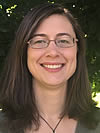
Christine A. Regalla
Boston University
2016 Doris M. Curtis Outstanding Woman in Science Award
Presented to Christine A. Regalla
Citation by Eric Kirby
It is my pleasure to present the citation for the 2016 Doris M. Curtis Outstanding Woman in Science Award to Christine Regalla of Boston University. This award recognizes her innovative analysis of upper plate deformation, forearc subsidence and plate kinematics in northeastern Japan. Although this region is considered one of the canonical examples of subduction erosion along a convergent margin, Christine’s work provided compelling evidence that vertical motion of the forearc is a manifestation of coordinated changes in Late Cenozoic tectonism throughout the entire upper plate. The recognition that vertical motions of forearc regions may be a dynamic response to changes in relative plate motion challenges the current paradigm for mass fluxes along subduction zones. More importantly, this work is exemplary of the breadth and creativity with which Christine approaches problems in active tectonics, spanning structural geology, geomorphology and geodynamics. Please join me in congratulating Christine on this well-deserved award.
2016 Doris M. Curtis Outstanding Woman in Science Award — Response by Christine A. Regalla
It is an incredible honor to be recognized by the Geological Society of America for this award. I want to thank and acknowledge my Ph.D. advisors, Donald Fisher and Eric Kirby, and my postdoctoral advisors, Christie Rowe and Yajing Liu, for their nomination, and even more so for the immense guidance and mentorship they have given me over the years. I am humbled when I reflect on the many pioneering contributions that have been made in the geosciences by women like Doris Curtis, and am further motivated when I see the high caliber and quality of work being carried out by the outstanding women all around me in the field today. I hope that collectively through our scientific and educational contributions, we can all continue to encourage people of all backgrounds to pursue further advancement in the geosciences, and to foster the interdisciplinary collaborations necessary to tackle scientifically and societally relevant research challenges.
